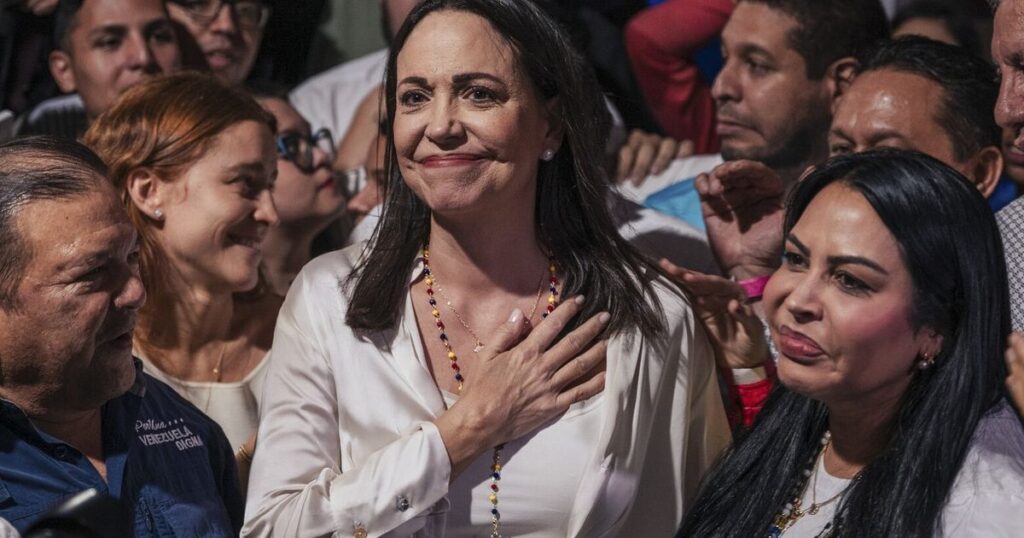María Corina Machado, the winner of this year’s Nobel Peace Prize, has emerged as a strong supporter of President Donald Trump’s military buildup in the Caribbean, arguing, like Trump, that Venezuela’s autocratic leader, Nicolás Maduro, poses an enormous security threat to the region.
“This is about saving lives,” she told Fox News last month after the United States began bombing suspected drug boats in the Caribbean, “not only Venezuelan lives, but also lives of American people, because as you have said, and we have heard, Maduro is the head of a narco-terrorist structure of cooperation.”
Machado, in statements to the press in recent weeks, has said that should Maduro fall, her movement was prepared to take territorial and administrative control of Venezuela, and that they have a plan for the first 100 hours and the first 100 days of a transition.
She has also touted an economic plan to American and other investors, saying that a democratic Venezuela under her movement’s control has the potential to generate $1.7 trillion in wealth in 15 years.
Since September, the Trump administration has been targeting what it calls drug boats in the Caribbean. But the size of the military buildup in the region, and Trump’s increasingly strident threats against Maduro, have led many people in both countries to think that the Trump administration’s real objective is Maduro’s removal — possibly by force.
Machado has largely avoided commenting on whether Maduro’s removal should involve U.S. military intervention inside Venezuela.
In an interview last month, her adviser for international affairs, Pedro Urruchurtu, said that her team was communicating with the Trump administration about plans for Maduro’s removal.
The opposition’s strategy, he said, includes persuading other governments, including the United States, to take diplomatic, financial, intelligence and law enforcement actions against Maduro.
But, he added: “It has to be done with the use of force, because otherwise it wouldn’t be possible to defeat a regime like the one we’re facing.”
Machado’s party, Vente Venezuela, has been sharing online the threats made by Trump officials against alleged Venezuelan drug traffickers.
“If you’re in the Caribbean, if you’re north of Venezuela,” the party wrote on the social platform X, echoing a statement from U.S. Secretary of Defense Pete Hegseth, “and you’re trying to traffic drugs to the US, you’re a legitimate target for the US.”
Over the last decade, as Venezuela’s economy crumbled, Maduro’s security forces hunted political enemies and the opposition weakened. Many in the country lost hope for any kind of political change. Then came Machado, who managed to unite voters around the common goals of restoring democracy and reuniting families torn apart by migration.
A conservative former lawmaker who had been a political foil to the socialist ruling party, on the campaign trail Machado mostly tempered any partisan economic talk and focused on what united most Venezuelans: the pain of family separations and the loss of political freedoms.
When the government banned her from running in the July 2024 election, she got a surrogate, Edmundo González, on the ballot. Despite constant harassment on the campaign trail, and the detention of many supporters, Machado crisscrossed her nation and inspired millions to come out on Election Day. Then, after Maduro declared victory, her movement collected and counted thousands of paper vote tallies from polling stations, uploading them online.
Her movement said the tallies showed the opposition had won overwhelmingly. An independent vote monitor, the Carter Center, found that count to be accurate.
It was the most resounding rejection of the regime created by Maduro’s predecessor, Hugo Chávez, in its 25-year existence.
But Machado had no way to enforce the results. The military stood by Maduro. Thousands of her supporters took to the streets. A government crackdown led to at least two dozen deaths and the capture of more than 2,000 political prisoners, ending the protests quickly. Machado went into hiding in Venezuela, and González fled to Spain.
The election of Trump, who had tried to oust Maduro in his first term, was a turning point. As soon as his win was announced last year, Machado began trying to convince his allies that the U.S. president could successfully remove Maduro this time around.
In a series of interviews with The New York Times late last year, Machado said that for Trump, Venezuela offered “an enormous foreign policy victory in the very, very short term.”
Maduro was very weak, she claimed, and through a pressure campaign Trump could force him to recognize the result of the 2024 Venezuelan vote — and leave.
Machado has ties in Washington that go back more than 20 years. The U.S. government provided financial aid to a voters’ rights group she founded in the early 2000s, and she met President George W. Bush at the White House in 2005. She has known Marco Rubio, the U.S. secretary of state, for more than a decade, she said.
But for a time, it was unclear if Trump would pay attention to Venezuela, or Machado’s call for help. In the early months of his administration, it seemed the United States was headed toward a seminormalization of the relationship with Maduro’s government.
A special envoy appointed by Trump, Richard Grenell, made an uncommon visit to Caracas, shaking hands with the autocrat, and began to negotiate economic and diplomatic deals.
But something changed in August. The Trump administration began sending warships into the Caribbean, declared Maduro the head of terrorist organization flooding the United States with drugs — though only about 8% of the cocaine reaching the United States, and virtually none of the fentanyl, passes through Venezuela.
Trump ordered the attacks on boats in the Caribbean, and directed Grenell to cut off diplomatic talks with Venezuela.
On Fox News just after the U.S. began bombing boats near Venezuela, Machado said that Maduro “is understanding finally that the time of impunity is over and it is in his best interest to accept the will of the people that voted against him. It’s time to go.”

